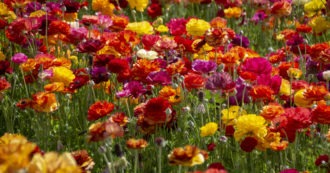“All you have to do is decide that wherever you are is the best place”. Wonderful thought, by Sodō Yokoyama (1907-1980) that it would do us great good to adopt more often in the era of fast and furious, against the metastasis of desires and obsessions (mostly induced) that afflicts us. His friend Tiziano Fratus, Homo radix, writer and rural Buddhist, introduced it into his existence, placed it as exergo of a good book, Tree Sutrarecently released by Piano B Edizioni.
I have known Titian for several years, since I reviewed him on the pages of The print and we were participating in Turin Spirituality, sharing the passion for forests and trees, for ecological culture, a feeling that has naturally not abandoned us. I met him at the end of a very fertile period of life, the one in which I worked for the cultural editorial staff of La Stampa in via Marenco, a few meters from that of Tuttobooks and a stone’s throw from the river Po, in one of the most enchanting districts of Turin in terms of landscape.
I say this because at the time I had written a book about trees and parks and Turin writers, I had worked for “Tuttoscienze” and for Culture and I was pursuing a vision idyllic of existence, I was an ante litteram ecologist. I met Tiziano when the headquarters of the newspaper had moved to via Lugaro, far from the river and the hill. With his books on greenery he reminded me of the trees I had written so much about, and the dialogues with Nico Orengo, a writer-gentleman passionate about greenery, a habitué of the enchanting Mortola and of the Hanbury Gardens, a stone’s throw from Ventimiglia, a friend of Calvin and Biamonti. It reminded me that Elsewhere of my youth were (and still are) i woods – even those of Big Sur on the California coast, echoing Jack Kerouac, which inspired me to hitchhike. A form of generational dialogue.
Sorry the detourwhich does not lead us astray. Because Titian Fratuswith the due generational and character differences, he walks the same tree-lined and conceptual, ecological path as me, he is a writer-poet hors catégorie.
Today many proclaim themselves ecologists, but few try to live ecology to the fullest, intellectually, emotionally. Fratus has made it a philosophy of life. He speaks of the sound of the barks, of the places in which to “forest oneself” in Italy with poetic and lexical tension: “Man is the flower that must blossom from the ruins of himself and that through liberation will put forth branches and leaves and will be one with the Whole ”. (Massimo Dai Do Strumia, 1950-2010). The “tree sutra” tells us – a bit like Jung in the Red Book – to enter the desert and make it blossom. He suggests cultivating a vegetable garden, a garden: “What you sow sooner or later is reborn and grows, outside of us and therefore also inside us”. Another beautiful thought, but sometimes even trees die, and gratitude is not of this earth. But it’s good to hope so.
The goal is to find peace, sorry if it’s not much. Going against the tide, accepting failures and silence, climbing into the sky at the risk of finding nothing there, like the Buzzatian lieutenant Drogo, is the one who gets up, shaves, smiles in the mirror and has mercy on his brothers in misfortune. Fratus becomes devotee in the hollow belly of the woods, meets the gaze of the Zen pioneers, recalls the vast literature that intertwines paper and nature, as in the Japanese tradition.
Fratus abandons himself to the embrace of the patriarchs, in the solitude of the woods he feels the pulsation of freedom: “Radico ergo sum”. “Man who enters nature understands by himself, one experience after another, that life has no obligatory direction, that everything – starting from the time we are given, from the energies we use, from the desires and by the limits by which we make ourselves we measure – it is a gift without a precise meaning: we are the life we decide to wear”.
Beat and remove, that’s what happens to us. As he said Jordanian Bruno, everything is center and everything is periphery. The real struggle is with oneself, it is finding the crux, the thread that sews together day and night, light and darkness, good and evil and the sages of Buddhism, as in the book of Fratus, a Buddhism practiced more in nature than in community or in monasteries, in its most sacred places. To become “a lone rider of the Dharma”.
Blogs | Tiziano Fratus walks the same tree-lined and conceptual path as me – Il Fatto Quotidiano

